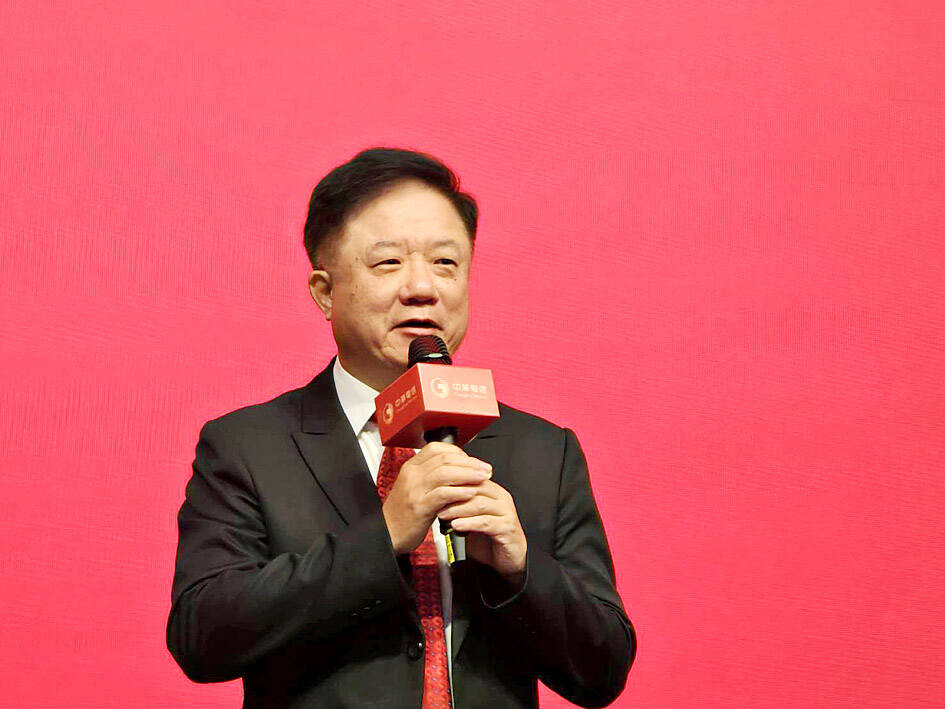Chunghwa Telecom Co (CHT, 中華電信) yesterday said it is boosting expenditure on deploying new undersea cables this year to as much as NT$2 billion (US$60.9 million) to meet customer demand, enhance operational resilience, and avert natural disasters and geopolitical risks.
The nation’s biggest telecom plans to install two new submarine cables — Southeast Asia-Japan Cable 2 (SJC2) and Apricot — in the first half of this year, Chunghwa Telecom chairman Alex Chien (簡志誠) said yesterday.
The company is also in talks with potential partners to deploy multiple new submarine cables, Chien said.

Photo: Wang Yi-hung, Taipei Times
“As long as those [undersea cables] connect Taiwan to Southeast Asia or Pacific nations, we would be interested in investing,” he said.
The SJC2 submarine cable system spans 10,500km, connecting 11 cable landing stations in Singapore, Thailand, Cambodia, Vietnam, Hong Kong, Taiwan, China, South Korea and Japan.
Apricot is a 12,000km cable system connecting Japan, Taiwan, Guam, the Philippines, Indonesia and Singapore.
In addition to new cables, the company is also allocating money to repair two damaged domestic undersea cables that connect Taiwan and Lienchiang County (Matsu). The cables were apparently damaged by Chinese ships last month, it said.
The company plans to allocate 25.2 percent more expenditure on the non-mobile segment this year, including the construction of submarine cables to support its business expansion into artificial intelligence (AI) and AI data centers, while spending on the mobile-related segment would shrink 13.3 percent, it added.
Overall, the company plans NT$32.36 billion of capital expenditures this year, up 12.3 percent from NT$28.82 billion last year.
In addition to undersea cables, CHT is mulling introducing more medium Earth orbit satellites and high Earth orbit satellite Internet services this year to help the government and large enterprises to protect their data when submarine cables are damaged, Chien said.
CHT last year inked agreements with OneWeb and SES to provide low and medium Earth orbit satellite services.
Net profit this year is forecast to shrink by 0.3 percent to 3.4 percent to between NT$45.3 billion and NT$46.72 billion compared with last year. Earnings per share would be in the range from NT$4.62 to NT$4.82, the company said.

The Central Election Commission has amended election and recall regulations to require elected office candidates to provide proof that they have no Chinese citizenship, a Cabinet report said. The commission on Oct. 29 last year revised the Measures for the Permission of Family-based Residence, Long-term Residence and Settlement of People from the Mainland Area in the Taiwan Area (大陸地區人民在台灣地區依親居留長期居留或定居許可辦法), the Executive Yuan said in a report it submitted to the legislature for review. The revision requires Chinese citizens applying for permanent residency to submit notarial documents showing that they have lost their Chinese household record and have renounced — or have never

A magnitude 5.6 earthquake struck off the coast of Yilan County at 12:37pm today, with clear shaking felt across much of northern Taiwan. There were no immediate reports of damage. The epicenter of the quake was 16.9km east-southeast of Yilan County Hall offshore at a depth of 66.8km, Central Weather Administration (CWA) data showed. The maximum intensity registered at a 4 in Yilan County’s Nanao Township (南澳) on Taiwan’s seven-tier scale. Other parts of Yilan, as well as certain areas of Hualien County, Taipei, New Taipei City, Taoyuan, Hsinchu County, Taichung and Miaoli County, recorded intensities of 3. Residents of Yilan County and Taipei received

Taiwan has secured another breakthrough in fruit exports, with jujubes, dragon fruit and lychees approved for shipment to the EU, the Ministry of Agriculture said yesterday. The Animal and Plant Health Inspection Agency on Thursday received formal notification of the approval from the EU, the ministry said, adding that the decision was expected to expand Taiwanese fruit producers’ access to high-end European markets. Taiwan exported 126 tonnes of lychees last year, valued at US$1.48 million, with Japan accounting for 102 tonnes. Other export destinations included New Zealand, Hong Kong, the US and Australia, ministry data showed. Jujube exports totaled 103 tonnes, valued at

BIG SPENDERS: Foreign investors bought the most Taiwan equities since 2005, signaling confidence that an AI boom would continue to benefit chipmakers Taiwan Semiconductor Manufacturing Co’s (TSMC, 台積電) market capitalization swelled to US$2 trillion for the first time following a 4.25 percent rally in its American depositary receipts (ADR) overnight, putting the world’s biggest contract chipmaker sixth on the list of the world’s biggest companies by market capitalization, just behind Amazon.com Inc. The site CompaniesMarketcap.com ranked TSMC ahead of Saudi Aramco and Meta Platforms Inc. The Taiwanese company’s ADRs on Tuesday surged to US$385.75 on the New York Stock Exchange, as strong demand for artificial intelligence (AI) applications led to chip supply constraints and boost revenue growth to record-breaking levels. Each TSMC ADR represents